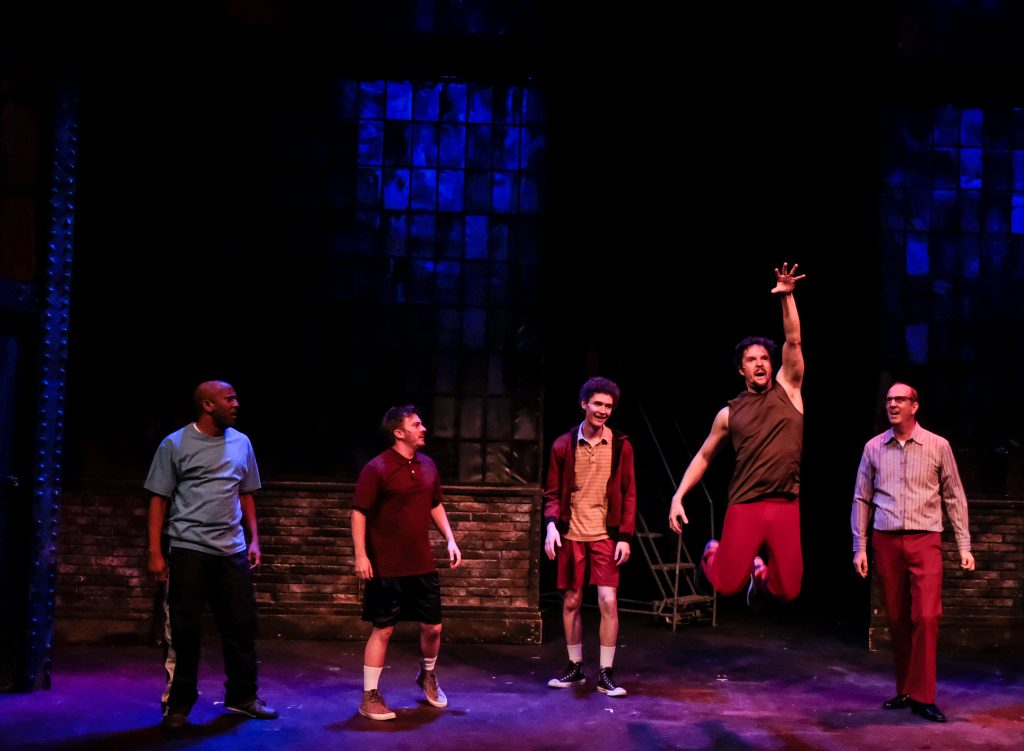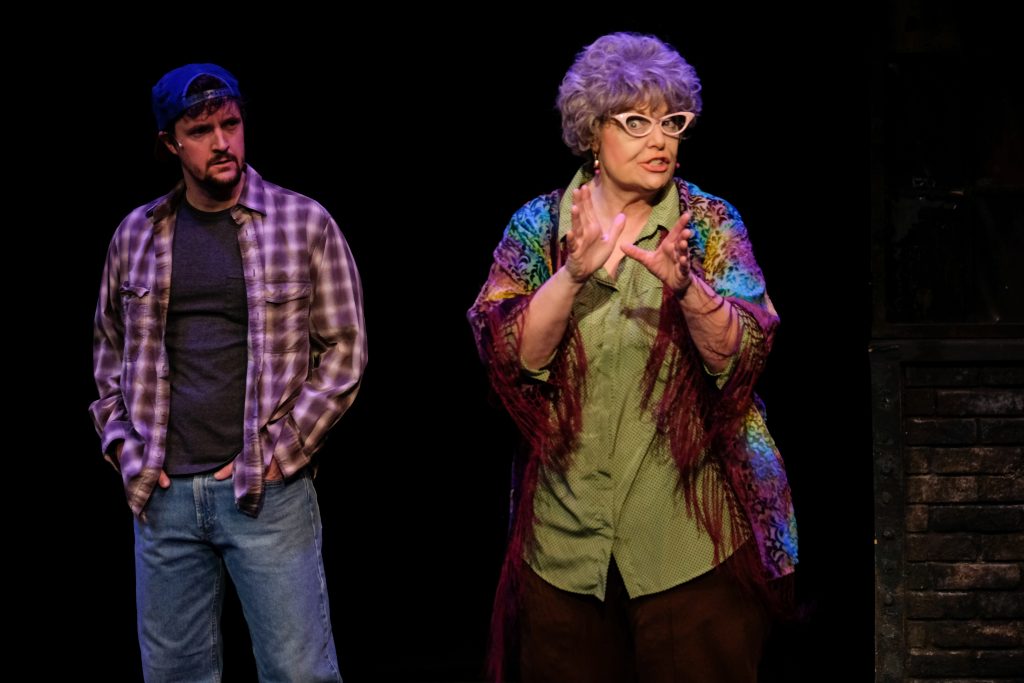Finding Opportunities During Unemployment

Ron Christopher Jones, Jonathan Sangster, Jack Eld, Steven Freitas and Richard Van Slyke. (Photos courtesy of Ken Jacques.)
That’s one of the aspects about the 2000 musical comedy The Full Monty which continues to be relevant in 2018. Almost all the main characters are nervous as to whether other people find them attractive.
In this production adapted from the Oscar-nominated movie, some blue collar-workers are fired from their jobs in Buffalo, New York. Among them are a divorced deadbeat father, Jerry Lukowski (Steven Freitas), and his best friend Dave Bukatinsky (Danny Stiles), who hope to find a way to earn money.
Jerry soon comes up with a plan that the two of them, along with some new pals, will become male strippers.
For about five minutes, theatregoers going into The Full Monty without any knowledge of the plot may think that the entire evening is going to be a gratuitously raunchy tale. However, by the time Jerry is introduced, it’s clear that the story will be much deeper than those audience members originally envisaged. David Yazbeck’s “I want” song, “Scrap,” creates a degree of investment for the former steel mill workers.
Although the original film featured a British cast, this show is an Americanized version that keeps the basic plot intact. What’s unique about San Diego Musical Theatre’s production at the Horton Grand Theatre, is that the director is Liverpool-born artist, Neil Dale. He finds the humor and the heart of Terrence McNally’s book.
Performances from Freitas, Stiles, Jonathan Sangster, Richard Van Slyke, Ron Christopher Jones and Jack Eld explore the quirks and foibles of the unemployed men. Instead of upstaging each other, they all come together to work as a true ensemble. None of them play their parts as one-note comedic caricatures, and their struggles and hardships feel real and resonate with the audience.
Accompanying Jerry, Dave and the others, on piano is the strange and hardworking Jeanette Burmeister (Devlin). The performer, who is unrecognizable thanks to Peter Herman’s hair and wig, completely loses herself in the role. It’s a treat watching Devlin throw out a bunch of one-liners, and her cynical handling of the big Act II opener, “Jeanette’s Showbiz Number.”
Speaking of songs, a major issue on opening night shouldn’t be ignored. Throughout Act I, there were several instances where performers weren’t in sync with the eclectic orchestra led by conductor Don LeMaster (crisply heard owing to Kevin Anthenill’s audio).
Moments where certain artists started crooning lyrics a few seconds late might not have been noticed by Full Monty novices, but they were probably distracting to fans of the show. My guess is that this problem is already fixed.
In comparison, Act II felt much tighter, with practically no slipups from the stars, and everyone seemed much more self-assured when it came to synchronizing with the musicians. The vocals from the cast were very expressive in funny numbers like “The Goods” and poignant tunes like “You Walk With Me.”

Steven Freitas and Devlin.
What makes the journey that Jerry and the others embark on so empathetic to the audience is that their behavior is generally grounded and unexaggerated. All of them are affected by fear and self-doubt as they get closer to their stripping engagement.
Pushing them forward towards their plan is the bond that they share. If they don’t always verbally share their feelings for one another, their actions prove how much their friendship matters to them.
True to its source material, yet still standing on its own, Dale’s interpretation doesn’t skimp on laughs or pathos. While one might not want to become a stripper after the evening is over, it’s easy to be moved by the morals about camaraderie and teamwork.
DOWNLOAD MUSICAL NUMBERS AND CAST AND CREW HERE
[box] Show times are Sundays at 2:00 p.m, Wednesdays at 7:30 p.m, Thursdays at 7:30 p.m, Fridays at 8:00 p.m and Saturdays at 8:00 p.m. [/box]

A fan of theatre from a young age, David Dixon began writing reviews while in middle school, for Union Tribune’s Rated G column and sdcnn.com. He was the Entertainment Editor for SDSU’s The Daily Aztec. Currently, he contributes to San Diego Community News Network, a regional reviewer for Talkin’ Broadway, an interviewer for San Diego Theatre Reviews and has won several San Diego Press Club Excellence in Journalism Awards. David is a San Diego Theatre Critics Circle member, an American Theatre Critics Association member & Regional Theatre Tony Award voter.


